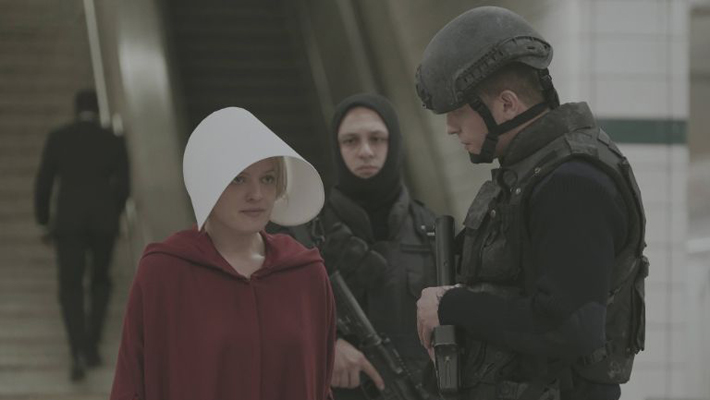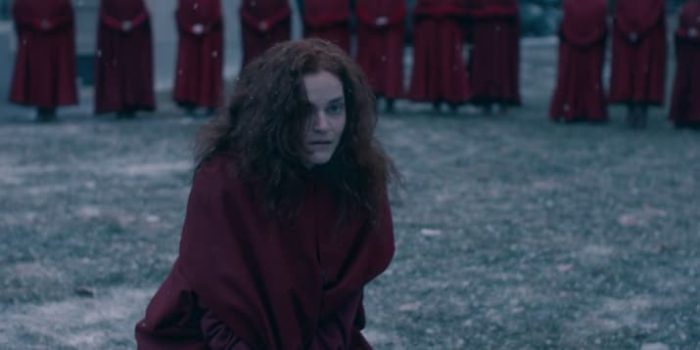Blessed be, kittens, can you believe it’s been a full week since we last saw our buddy June? In the long pause while we wait for season 2 to drop, let’s have a quick chat about the show versus the book. If you have seen the show but not read the book, read further with caution. I will be discussing both similarities and differences, and while I do not personally fret over the purity of reading unawares, I know that some do. If you want to go into the novel wet, please take your cherry and come back after the last page.
I went into season one of The Handmaid’s Tale with certain hesitations, borne of the fact that I legitimately loved the book. Those concerns ultimately proved rather fruitless, however, as one of the greatest strengths of the show ended up being the devotion and commitment shown to Margaret Atwood’s source material. Atwood is inarguably one of the greatest living writers, and her book was borderline perfect. If you have not read it, it is a first person account, told through June’s voice, in medias res.

The book begins at the Red Center, but quickly moves to Fred’s house. The thrust of June’s story remains nearly identical; the characterization of her as an intelligent woman forced by bitter circumstance into a sort of passivity and her awakening from that fugue are all faithful to the June of the novel. Within the framework of June’s narrative, perhaps the greatest divergence is the representation of Serena Joy. Novel Serena was something of a Tammy Faye Baker figure; a good deal older than June, with more of a performative, televangelist quality. The decision to make her younger could have sprung from myriad motivations. The theory I most subscribe to, however, relies on the fundamental physical similarities between June and Serena. True, Serena towers over June like some witchy, blond willow tree, but strip that away. We have two similarly aged white, blond, blue eyed women. No remarkable feat that Fred could smuggle June through as his wife – the resemblance is not striking, but it is undeniable. There is an eerie mirrored quality to June and Serena. Both are educated women who seem to come from similar socio-economic platforms. Both are well read. As the series progresses, we see that both are quite adept at manipulating Fred. Our Fred certainly has a type. In fact, the greatest commentary of the similar features of June and Serena has nothing to do with either woman, but rather the reflection it provides of the man in question. No doubt that Fred gets off on the power he wields, but also on the notion of infidelity as a concept. If it is June’s similarities to Serena (and I think there is ample evidence to support that it is) that draws him to her, than it isn’t about the woman, it is about the act. Fred is chronically drawn to the notion of infidelity, perhaps because it is forbidden, or perhaps because on some very basic level, it is unsatisfying to fuck merely for procreation. It is written clearly through the actions of the women; the men obscure their motives.

And while this particular bit of canon divergence I think serves a purpose, unfortunately most of the weaker aspects of the show arise where liberties are taken from the source material. The careful reader may recall my incredibly subtle, wildly veiled issues with Luke’s episode. I am taking this opportunity not to go on an additional rant (though I assure you the temptation is great) but to establish that I have no issue with Luke being given greater agency or a more rounded character. The umbrage I took then and continue to take is the disservice it did to June to remove her so thoroughly from her own narrative. Because this season was so near to the book, the perspective was (rightly) very close to June’s. Recall that she provides voiceover for much of the series; that voiceover is taken largely and often almost verbatim from passages in the book. For the viewers who have also read the book, this is a sort of reinforcement that this story is entirely June’s, and the narrative belongs to her. Perhaps save Luke for the second season. Or tease out his story in flashes throughout. The episode felt completely other, for a show that so nearly echoed the nightmare qualities of its source material.

The finale included one notable scene of canon divergence, about which I have highly mixed emotions. The scene where the maids are called on to stone Janine is entirely synthesized for the series. It is a beautiful scene, well-wrought and gorgeously acted. It feels like a triumph. And there is something admirable about that. I loved it, but I am also not entirely sure from a strictly narrative perspective that it belonged in this story. I understand that the purpose was to return to June some of the agency she lost. That temptation is great. But is it honest? June’s desperation has certainly grown in the show, as it did in the book, but all of her machinations have been measured. Cautious. June intends to survive, and such an overt display of defiance does not support that notion.

But perhaps the greatest moment of canon divergence is the invisible ellipsis at the end. The novel ends with the reveal that the account we have been reading was found by scholars in a post-Gilead society. But there is no closure for June; no certainty about what happens when the van doors close. The mere knowledge of a season two tells us that we are dealing with a dinosaur altogether different. Because either we will be going on the continued adventures of June (please no. Her story concluded beautifully, and to add any post scripts to it would be to diminish it), which don’t exist, or we are going to explore the histories of other handmaids, which also don’t exist.
I have a morass of varied and differing emotions about the impending season 2. The amazing service season one did to an absolute favorite book cannot be overstated. I would like to keep that sacred in my mind. Nevertheless, I will be back for season 2, and may the Lord open, it will be a continued tribute to one of the best novels of the last century.
Now one more time, in honor of Moira:
Don’t let the bastards grind you down, bitches.

Excellent tribute to Margaret Atwood! Loved the book also. And, the show! Agreed and agreed with your comments and comparisons. Though why men cheat is an age-old question and so not confined to Fred or any of the other powerful men in the story. Where there is forbidden fruit there will be men to pluck it.
Hello commenter named Millie who’s definitely not at all my mom….I agree about the nature of infidelity. And in fact assumed that Fred was intended as an archetypal man intended to demonstrate that exact thing!